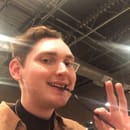If there’s one thing I’ve learned as an openly queer man, it’s that there is a level of separation between myself and my heterosexual counterparts. And while I cannot personally point to a time where being publicly out has hindered me, I am not afforded the same level of general comfort that straight people are.
On the same token, I am a white person who is very close friends with a Black woman. Through this, I have had to learn how to be an ally for Black people and other people of color alike. Likewise, Black people are not afforded the same level of general comfort that white people are.
There is a lot of misunderstanding as to what being an ally can entail.
Alliance is a tricky thing to navigate, but the most common misconception is that it is merely acceptance of a marginalized community for what they are. It is much more nuanced than that. It involves actively working toward the betterment of a marginalized community that you are not yourself a part of. That being said, a lot of allies are conditional, which is not okay. To offer an example, conditional alliance for Black people could look like only wanting to be friends with Black people who “act white,” which in itself is a racist idea.
I, myself, am a part of the queer community, so I will further discuss queer alliance in more detail because it is what I understand best.
For the queer community, conditional alliance could look like accepting one part of the gay community but not another. For example, someone could be in support of gay people but not trans people, though they are both in the same community.
This specific example poses a threat to queer people in a few ways. First and foremost, it perpetuates the idea that gay people are only allowed to progress if straight people allow them to. It shapes guidelines for queer expression. Furthermore, this only allows queer people to express themselves and take ownership over their identities as far as straight people are willing to accept. And this can be applied to femininity, race, and class struggles alike. Accepting people for what they are with no caveats is extremely important for allies of any marginalized community.
In my life, I feel that I am accepted by my family as a gay man but as long as I stay within traditional gender boundaries. I feel that this is a condition that a lot of queer people face. Masculine presenting gay men, for example, catch a lot less flack for passing as straight. It’s almost as if allies are offering their support as long as long as the marginalized community isn’t too different from their own.
One thing that alliance does not entail is being an actual part of the marginalized community. Many allies feel as though they understand the struggles of being marginalized as if they had first-person experience with it. As with the LGBTQIA+ community, some allies think the A stands for Ally. In fact, it stands for Asexual, which many gloss over as a fake sexual orientation, which is a subject for another article. While allies may face resistance for aligning with marginalized people, they don’t experience discrimination at the same intensity at all. It is important to recognize the separation between being an ally and being marginalized.
On the other hand, I have had people of color tell me I’m “not actually white,” purely because I am very empathetic to the marginalization of non-white people. My reply is always, “Yes, I very much am white,” because I know that I will never be able to understand the struggle of racism. I have white privilege, and race is something I don’t often have to think about for myself.
I do feel that I can empathize with minority populations more because I am queer, though I don’t often face direct discrimination because of it. I will never be as marginalized as a person of color, as a trans person, or as someone at the intersection of one or more groups.
Allow me to provide an anecdote.
I attended a panel for trans people recently that was run by cis people. One thing that bothered me as well as some others was the fact that one of the cis interviewers asked the trans panelists about their appreciation for their cis allies. They were essentially put on the spot in front of a room full of people and made to recognize cis people for working on their behalf. Personally, I believe allies shouldn’t draw attention to themselves at all when the discussion is not about them. Additionally, it’s not a great thing that cis people were able to hold that amount of agency over a project about trans people. While I get that there may be few trans people with an English background to be able to work on such a project, cis people working on the project should be capable of not directing attention to themselves.
Allies shouldn’t speak for marginalized communities, but rather use their privilege to amplify the message for them.
The number of people that reward themselves for “having a gay friend” or “having a Black friend” don’t truly understand how little that actually means. And as negative as all of this may sound, I do think allies are important. I do, however, think a lot of them are misguided. I don’t want a pat on the back for being an ally to my trans brothers, sisters, and everything in between, my friends of color, my female friends, or my underprivileged friends. I don’t want to bring attention to myself for being an ally. I just want to make things better for people with less privilege than I.


